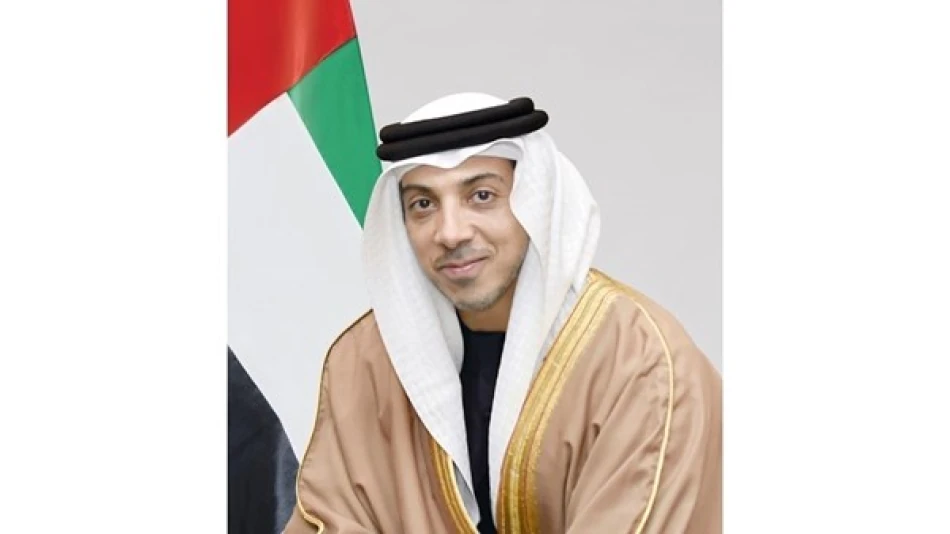
Pioneering Rail, Transport, and Infrastructure Event in Abu Dhabi: Mansor bin Zayed's Patronage
UAE Launches Global Railway Summit to Position Itself as Regional Transport Hub
The UAE is making a bold play to become the Middle East's railway and logistics powerhouse with the launch of its first Global Railway, Transport and Infrastructure Exhibition and Conference in Abu Dhabi. Running from October 8-10, 2024, this high-profile event signals the Emirates' serious commitment to diversifying its economy beyond oil and establishing itself as a critical link in global supply chains.
Strategic Timing Amid Global Infrastructure Boom
The conference comes at a pivotal moment when governments worldwide are pouring unprecedented funds into rail infrastructure. With over 15,000 decision-makers, 1,000 company representatives from multiple countries, and 300+ exhibitors from 40+ nations expected to attend, the UAE is clearly positioning itself to capture a significant share of the global railway market, estimated to reach $295 billion by 2030.
The event's theme, "Enhancing Transport Infrastructure and Enabling Global Connectivity," directly challenges established transport hubs like Singapore and Hong Kong while capitalizing on the UAE's strategic location between Europe, Asia, and Africa.
Six Pillars of Railway Transformation
The conference will tackle six core areas that reflect current industry priorities:
Sustainability and Carbon Reduction
With rail transport producing 75% fewer emissions than road freight, the UAE is betting on railways as a key component of its net-zero ambitions. This aligns with global trends where countries like Germany and Japan are heavily investing in electric rail networks to meet climate targets.
Smart Technology Integration
The summit will showcase next-generation railway services and intelligent systems, including AI-powered automation. This mirrors China's success with high-speed rail technology and positions the UAE to compete with tech-forward transport systems in South Korea and Japan.
Regional Connectivity Vision
Perhaps most significantly, the conference supports the broader GCC railway network vision—a potential game-changer that could create a seamless transport corridor from Kuwait to Oman, dramatically reducing logistics costs across the Gulf.
Market Implications and Investment Opportunities
For investors and industry players, this summit represents more than networking—it's a clear signal of where Middle Eastern infrastructure spending is headed. The UAE's Etihad Rail project, already connecting major ports and industrial zones, could become the backbone of a regional transport revolution.
Key opportunities emerging from this initiative include:
Advanced railway technology partnerships, sustainable transport solutions, and logistics hub development contracts. Companies specializing in rail automation, green technology, and smart infrastructure systems should pay close attention to deals likely to emerge from this gathering.
Competitive Positioning Against Global Rivals
Unlike similar events in Europe or Asia that focus primarily on existing markets, the UAE summit targets emerging opportunities in a region experiencing rapid economic diversification. This strategic approach could help the Emirates leapfrog traditional transport hubs by offering more flexible, modern infrastructure solutions.
The involvement of high-level government officials, including Deputy Prime Minister Sheikh Mansour bin Zayed Al Nahyan, demonstrates the political commitment behind this initiative—a crucial factor that has historically determined the success of major infrastructure projects in the region.
Beyond Railways: Economic Diversification Strategy
This conference reflects the UAE's broader economic strategy of reducing oil dependence through strategic infrastructure investments. By positioning itself as a regional railway hub, the UAE aims to capture value from the growing intra-regional trade, particularly as supply chains diversify away from over-reliance on traditional shipping routes.
The timing is particularly astute, as global supply chain disruptions have highlighted the need for alternative transport corridors. A well-connected GCC railway network could offer businesses a reliable alternative to maritime shipping for regional distribution, potentially transforming trade patterns across the Middle East.
Most Viewed News

 Layla Al Mansoori
Layla Al Mansoori






